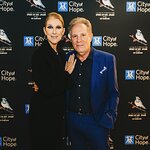o celebrate the 50th anniversary of International Literacy Day, 26 of the world’s most high profile personalities from film, music, politics and the arts, have joined forces to raise awareness for literacy with one common goal in mind: by 2030, no child will be born at risk of poor literacy.
Today, 32 million American adults cannot read and one in four children grow up without learning how to read. Globally, the numbers are even more staggering. One in 10 people on the planet are unable to read and write. Yet many do not realize that illiteracy is more than the inability to read a good book. Illiteracy is linked to almost every major global development challenge there is, from infant mortality and malnutrition to gender inequality and unemployment.
To demonstrate how illiteracy contributes to larger socioeconomic problems, the “Alphabet of Illiteracy” was created by Project Literacy – a movement convened by founding partner, Pearson and backed by more than 75 partners, including UNESCO, Microsoft, Room to Read, GOOD Magazine, Worldreader, Doctors of the World, The Big Issue, The Hunger Project, the National Literacy Trust and War Child.
The Alphabet of Illiteracy brings to life, in a powerful new way, a body of evidence and decades worth of research demonstrating that illiteracy can contribute to reduced life expectancy, radicalization, the spread of disease and violent crime.
Dr. Dan Wagner, UNESCO Chair in Learning and Literacy at the University of Pennsylvania and Director of Penn’s International Literacy Institute, said: “There is a strong argument that tackling illiteracy and low literacy, as a ‘foundational’ social problem, would pay greater dividends than tackling each issue separately. This approach also fits directly with the United Nations Sustainable Development Goals.”
In the Alphabet of Illiteracy, A is for AIDs, because if you can’t read or write, you are five times less likely to understand how people can contract HIV. B is for bloodshed because the rate of violent crimes such as homicide and sexual assaults is almost double among the illiterate population. C is for child brides, because if all women had a primary education, child marriages would reduce by a sixth. To view the full Alphabet of Illiteracy, click here.
From Julianne Moore to Idris Elba, Taylor Schilling and Elton John, 26 champions of literacy across the globe are elevating this issue and serving as advocates for change through a mass social media movement. Each advocate has adopted a letter from the Alphabet of Illiteracy that corresponds to a social cause they are passionate about. Their synchronized unique messages of support on Twitter will create a powerful wave of socially-driven awareness, designed to spur people into action around literacy.
“Literacy is a fundamental human right. The United Nation agrees. Without literacy there is no opportunity to transcend the economic and social constraints of past generations. We have made so much progress on so many other deeply important issues, from poverty to gender inequality, through financial and intellectual commitment. The cause of literacy for all is worth our best efforts. The ability to read and write, can, and will, change lives and pave the way for future generations to thrive. And on a personal level, reading has been the one thing that has at once opened the world to me, and made me feel less alone. We all deserve that,” said actress Julianne Moore.
Kate James, Chief Corporate Affairs and Global Marketing Officer for Pearson and spokesperson for Project Literacy, said: “Illiteracy is a global challenge and we all need to pull together if we are to combat its devastating impact. Project Literacy provides the umbrella for a global coalition of non-profit organizations, businesses, and government who together can ensure literacy helps solve some of the world’s most pressing problems.”
To mark the U.S. launch of the campaign, Project Literacy has taken to the streets of New York to create a stunning piece of interactive artwork in TriBeCa that showcases messages of support reproduced into pencils. The “Mighty Pencil” exhibit physically illustrates the power of reading and writing and how it can help change the world for the better. The exhibit is open to the public to celebrate International Literacy Day today only.
To get involved, visit projectliteracy.com/help and share a message of support, donate to one of Project Literacy’s 26 charity partners or sign a petition.






